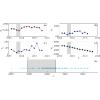当前位置:
X-MOL 学术
›
Phys. Rev. E
›
论文详情
Our official English website, www.x-mol.net, welcomes your
feedback! (Note: you will need to create a separate account there.)
Cooperator-driven and defector-driven punishments: How do they influence cooperation?
Physical Review E ( IF 2.2 ) Pub Date : 2019-11-01 , DOI: 10.1103/physreve.100.052304 Pengbi Cui 1, 2, 3 , Zhi-Xi Wu 4 , Tao Zhou 3, 5, 6 , Xiaojie Chen 7
Physical Review E ( IF 2.2 ) Pub Date : 2019-11-01 , DOI: 10.1103/physreve.100.052304 Pengbi Cui 1, 2, 3 , Zhi-Xi Wu 4 , Tao Zhou 3, 5, 6 , Xiaojie Chen 7
Affiliation

|
Economic studies have shown that there are two types of regulation schemes which can be considered as a vital part of today's global economy: self-regulation enforced by self-regulation organizations to govern industry practices and government regulation which is considered as another scheme to sustain corporate adherence. An outstanding problem of particular interest is to understand quantitatively the role of these regulation schemes in evolutionary dynamics. Typically, punishment usually occurs for enforcement of regulations. Taking into account both types of punishments to influence the regulations, we develop a game model where six evolutionary situations with corresponding combinations of strategies are considered. Furthermore, a semianalytical method is developed to allow us to give accurate estimations of the boundaries between the phases of full defection and nondefection. We find that, associated with the evolutionary dynamics, for an infinite well-mixed population, the mix of both punishments performs better than one punishment alone in promoting public cooperation, but for a networked population the cooperator-driven punishment turns out to be a better choice. We also reveal the monotonic facilitating effects of the synergy effect, punishment fine, and feedback sensitivity on the public cooperation for an infinite well-mixed population. Conversely, for a networked population an optimal intermediate range of feedback sensitivity is needed to best promote punishers' populations. Overall, a networked structure is overall more favorable for punishers and further for public cooperation, because of both network reciprocity and mutualism between punishers and cooperators who do not punish defectors. We provide physical understandings of the observed phenomena, through a detailed statistical analysis of frequencies of different strategies and spatial pattern formations in different evolution situations. These results provide valuable insights into how to select and enforce suitable regulation measures to let public cooperation remain prevalent, which has potential implications not only for self-regulation, but also for other topics in economics and social science.
中文翻译:

合作者驱动和叛逃者驱动的惩罚:它们如何影响合作?
经济研究表明,有两种类型的监管计划可被视为当今全球经济的重要组成部分:由自我监管组织实施的自我监管以管理行业惯例,而政府监管则被视为维持公司可持续发展的另一种计划。坚持。特别引起关注的一个突出问题是定量地了解这些调控方案在进化动力学中的作用。通常,惩罚通常是为了执行法规而发生的。考虑到两种惩罚都会影响法规,我们开发了一个博弈模型,其中考虑了六种具有相应策略组合的进化情况。此外,开发了一种半分析方法,使我们能够准确估计完全缺陷和未缺陷阶段之间的边界。我们发现,与进化动力学相关联,对于无限混合的人口而言,两种惩罚的混合在促进公共合作方面的效果要比单独对一种惩罚的效果要好,但是对于网络人口而言,合作者驱动的惩罚却是更好的选择。选择。我们还揭示了协同效应,罚款罚款和反馈敏感性对无限混合人群的公共合作的单调促进作用。相反,对于网络人口,需要一个最佳的反馈敏感度中间范围,以最佳地提升惩罚者的人口。全面的,网络结构总体上对惩罚者更有利,对公共合作更有利,因为网络互惠和惩罚者与不惩罚叛逃者的合作者之间的互惠互利。我们通过对不同策略的频率和不同演化情况下的空间模式形成进行详细的统计分析,从而对观察到的现象进行物理理解。这些结果为如何选择和执行适当的监管措施以使公共合作保持盛行提供了宝贵的见识,这不仅对自我监管,而且对经济学和社会科学的其他主题都有潜在的影响。我们通过对不同策略的频率和不同演化情况下的空间模式形成进行详细的统计分析,从而对观察到的现象进行物理理解。这些结果为如何选择和执行适当的监管措施以使公共合作保持盛行提供了宝贵的见识,这不仅对自我监管,而且对经济学和社会科学的其他主题都有潜在的影响。我们通过对不同策略的频率和不同演化情况下的空间模式形成进行详细的统计分析,从而对观察到的现象进行物理理解。这些结果为如何选择和执行适当的监管措施以使公共合作保持盛行提供了宝贵的见识,这不仅对自我监管,而且对经济学和社会科学的其他主题都有潜在的影响。
更新日期:2019-11-13
中文翻译:

合作者驱动和叛逃者驱动的惩罚:它们如何影响合作?
经济研究表明,有两种类型的监管计划可被视为当今全球经济的重要组成部分:由自我监管组织实施的自我监管以管理行业惯例,而政府监管则被视为维持公司可持续发展的另一种计划。坚持。特别引起关注的一个突出问题是定量地了解这些调控方案在进化动力学中的作用。通常,惩罚通常是为了执行法规而发生的。考虑到两种惩罚都会影响法规,我们开发了一个博弈模型,其中考虑了六种具有相应策略组合的进化情况。此外,开发了一种半分析方法,使我们能够准确估计完全缺陷和未缺陷阶段之间的边界。我们发现,与进化动力学相关联,对于无限混合的人口而言,两种惩罚的混合在促进公共合作方面的效果要比单独对一种惩罚的效果要好,但是对于网络人口而言,合作者驱动的惩罚却是更好的选择。选择。我们还揭示了协同效应,罚款罚款和反馈敏感性对无限混合人群的公共合作的单调促进作用。相反,对于网络人口,需要一个最佳的反馈敏感度中间范围,以最佳地提升惩罚者的人口。全面的,网络结构总体上对惩罚者更有利,对公共合作更有利,因为网络互惠和惩罚者与不惩罚叛逃者的合作者之间的互惠互利。我们通过对不同策略的频率和不同演化情况下的空间模式形成进行详细的统计分析,从而对观察到的现象进行物理理解。这些结果为如何选择和执行适当的监管措施以使公共合作保持盛行提供了宝贵的见识,这不仅对自我监管,而且对经济学和社会科学的其他主题都有潜在的影响。我们通过对不同策略的频率和不同演化情况下的空间模式形成进行详细的统计分析,从而对观察到的现象进行物理理解。这些结果为如何选择和执行适当的监管措施以使公共合作保持盛行提供了宝贵的见识,这不仅对自我监管,而且对经济学和社会科学的其他主题都有潜在的影响。我们通过对不同策略的频率和不同演化情况下的空间模式形成进行详细的统计分析,从而对观察到的现象进行物理理解。这些结果为如何选择和执行适当的监管措施以使公共合作保持盛行提供了宝贵的见识,这不仅对自我监管,而且对经济学和社会科学的其他主题都有潜在的影响。











































 京公网安备 11010802027423号
京公网安备 11010802027423号